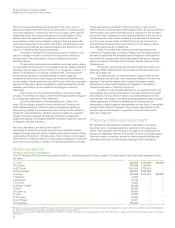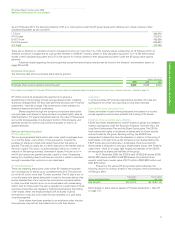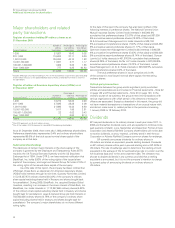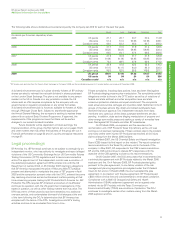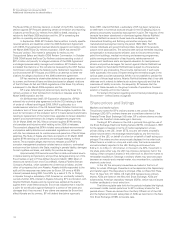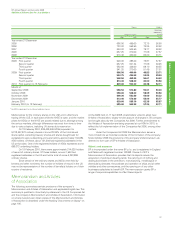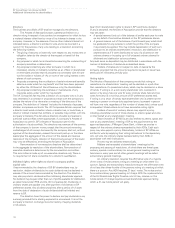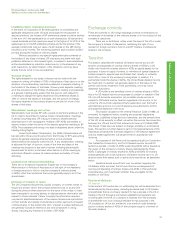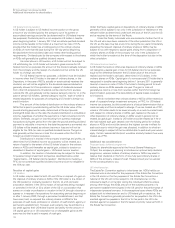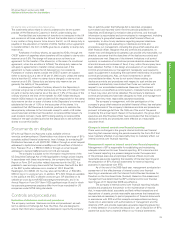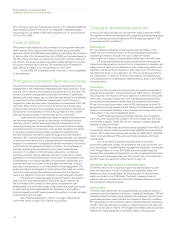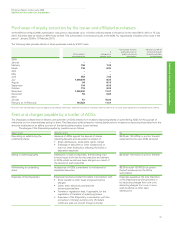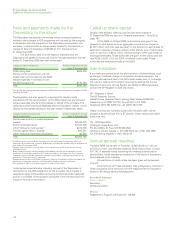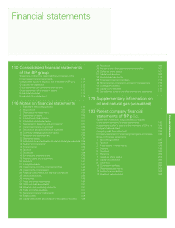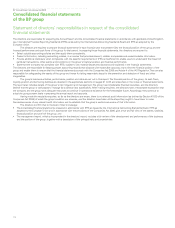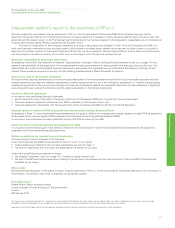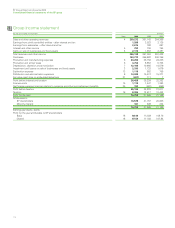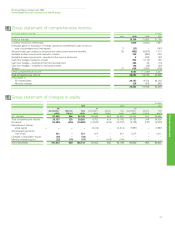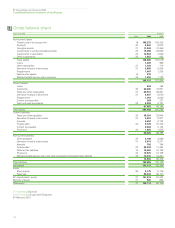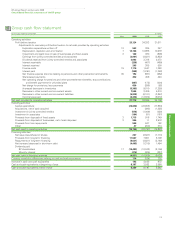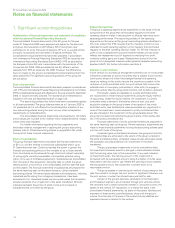BP 2009 Annual Report Download - page 108
Download and view the complete annual report
Please find page 108 of the 2009 BP annual report below. You can navigate through the pages in the report by either clicking on the pages listed below, or by using the keyword search tool below to find specific information within the annual report.
106
BP Annual Report and Accounts 2009
Additional information for shareholders
BP’s internal control over financial reporting as of 31 December 2009 has
been audited by Ernst & Young LLP, an independent registered public
accounting firm, as stated in their report appearing in our Annual Report
on Form 20-F 2009.
Code of ethics
The company has adopted a code of ethics for its group chief executive,
chief financial officer, deputy chief financial officer, group controller,
general auditors and chief accounting officer as required by the provisions
of Section 406 of the Sarbanes-Oxley Act of 2002 and the rules issued by
the SEC. There have been no waivers from the code of ethics relating to
any officers. The code has been amended to reflect changes to the titles
and posts of certain senior officers. The amended code of ethics has
been filed as an exhibit to our Annual Report on Form 20-F.
In June 2005, BP published a code of conduct, which is applicable
to all employees.
Principal accountants’ fees and services
The audit committee has established policies and procedures for the
engagement of the independent registered public accounting firm, Ernst
& Young LLP, to render audit and certain assurance and tax services. The
policies provide for pre-approval by the audit committee of specifically
defined audit, audit-related, tax and other services that are not prohibited
by regulatory or other professional requirements. Ernst & Young is
engaged for these services when its expertise and experience of BP are
important. Most of this work is of an audit nature. Tax services were
awarded either through a full competitive tender process or following an
assessment of the expertise of Ernst & Young relative to that of other
potential service providers. These services are for a fixed term.
Under the policy, pre-approval is given for specific services within
the following categories: advice on accounting, auditing and financial
reporting matters; internal accounting and risk management control
reviews (excluding any services relating to information systems design
and implementation); non-statutory audit; project assurance and advice
on business and accounting process improvement (excluding any
services relating to information systems design and implementation
relating to BP’s financial statements or accounting records); due diligence
in connection with acquisitions, disposals and joint ventures (excluding
valuation or involvement in prospective financial information); income tax
and indirect tax compliance and advisory services; and employee tax
services (excluding tax services that could impair independence);
provision of, or access to, Ernst & Young publications, workshops,
seminars and other training materials; provision of reports from data
gathered on non-financial policies and information; and assistance with
understanding non-financial regulatory requirements. Additionally, any
proposed service not included in the pre-approved services, must be
approved in advance prior to commencement of the engagement. The
audit committee has delegated to the chairman of the audit committee
authority to approve permitted services provided that the chairman
reports any decisions to the committee at its next scheduled meeting.
The audit committee evaluates the performance of the auditors
each year. The audit fees payable to Ernst & Young are reviewed by
the committee in the context of other global companies for cost
effectiveness. The committee keeps under review the scope and results
of audit work and the independence and objectivity of the auditors.
External regulation and BP policy requires the auditors to rotate their lead
audit partner every five years.
(See Financial statements – Note 14 on page 136 and Audit
committee report on page 74 for details of audit fees.)
Corporate governance practices
In the US, BP ADSs are listed on the New York Stock Exchange (NYSE).
The significant differences between BP’s corporate governance practices
as a UK company and those required by NYSE listing standards for US
companies are listed as follows:
Independence
BP has adopted a robust set of board governance principles, which
reflect the UK’s Combined Code and its principles-based approach to
corporate governance. As such, the way in which BP makes
determinations of directors’ independence differs from the NYSE rules.
BP’s board governance principles require that all non-executive
directors be determined by the board to be ‘independent in character and
judgement and free from any business or other relationship which could
materially interfere with the exercise of their judgement’. The BP board
has determined that, in its judgement, all of the non-executive directors
are independent. In doing so, however, the board did not explicitly take
into consideration the independence requirements outlined in the NYSE’s
listing standards.
Committees
BP has a number of board committees which are broadly comparable in
purpose and composition to those required by NYSE rules for domestic
US companies. For instance, BP has a chairman’s (rather than executive)
committee, nomination (rather than nominating/corporate governance)
committee and remuneration (rather than compensation) committee.
BP also has an audit committee, which NYSE rules require for both US
companies and foreign private issuers. These committees are composed
solely of non-executive directors whom the board has determined to be
independent, in the manner described above.
The BP board governance principles prescribe the composition,
main tasks and requirements of each of the committees (see the board
committees on pages 74-80). BP has not, therefore, adopted separate
charters for each committee.
Under US securities law and the listing standards of the NYSE, BP
is required to have an audit committee which satisfies the requirements
of Rule 10A-3 under the Exchange Act and Section 303A.06 of the NYSE
Listed Company Manual. BP’s audit committee complies with these
requirements.
One of the NYSE’s additional requirements for the audit
committee states that at least one member of the audit committee is to
have ‘accounting or related financial management expertise’. As reported
in BP Annual Report on Form 20-F 2008, the board determined that
Douglas Flint possessed such expertise and also possesses the financial
and audit committee experiences set forth in both the Combined Code
and SEC rules (see Audit committee report on page 74).
Shareholder approval of equity compensation plans
The NYSE rules for US companies require that shareholders must be
given the opportunity to vote on all equity-compensation plans and
material revisions to those plans. BP complies with UK requirements
which are similar to the NYSE rules. The board, however, does not
explicitly take into consideration the NYSE’s detailed definition of what
are considered ‘material revisions’.
Code of ethics
The NYSE rules require that US companies adopt and disclose a code of
business conduct and ethics for directors, officers and employees. BP has
adopted a code of conduct, which applies to all employees, and has board
governance principles which address the conduct of directors. In addition
BP has adopted a code of ethics for senior financial officers as required by
the SEC. The code has been amended to reflect changes to the titles and
posts of certain senior officers. BP considers that these codes and policies
address the matters specified in the NYSE rules for US companies.


